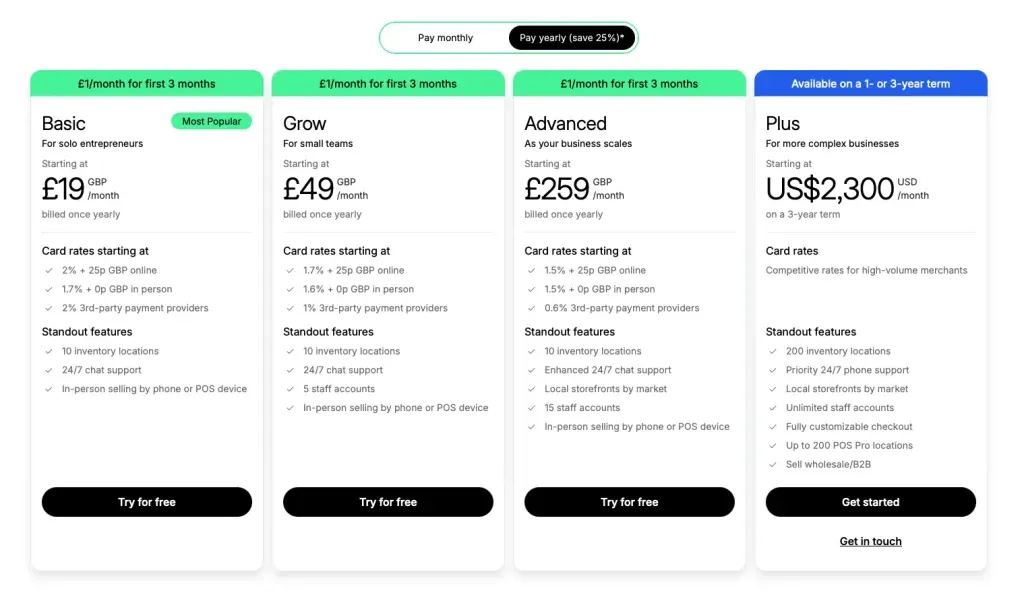Is Shopify the best all-in-one platform for your e-commerce business? We break down the 2025 plans, pricing, and powerful new AI features.
Shopify is an "all-in-one" e-commerce giant that allows anyone to build and launch an online store, even with no technical knowledge. It has become the "rock star" of online commerce by handling everything from web hosting and design to payments and shipping.
But is it the right choice for your business? With over 100 impressions for this guide and 69 for "shopify business plan," we know you're looking for a clear breakdown of its cost and capabilities.
We've analyzed the latest 2025 plans, pricing, and powerful new AI tools to give you the definitive guide.
What is Shopify?
Shopify is a cloud-based, subscription-based e-commerce platform. Unlike open-source tools like WooCommerce (which requires you to manage your own hosting and plugins), Shopify is a fully hosted solution. You pay a monthly fee, and in return, Shopify provides the website, the shopping cart, the payment processing (Shopify Payments), and 24/7 customer support.

Shopify Pricing Plans (2025): Which "Business Plan" is Right for You?
Choosing the right plan is the most critical step. As of 2025, Shopify offers three main plans, plus two specialty tiers.
Shopify Basic (£19/month)
This is the most popular plan and the perfect starting point for new businesses.
- Best For: New entrepreneurs and small stores.
- Key Features: A full online store, unlimited product uploads, 2 staff accounts, 2.9% + 30¢ transaction fee (with Shopify Payments), and standard analytics.
Shopify "Grow" Plan (£49/month)
This is the new name for the plan previously just called "Shopify".
- Best For: Growing businesses with a scaling team and higher sales volume.
- Key Features: Everything in Basic, plus 5 staff accounts, more advanced reports, and lower transaction fees (2.7% + 30¢), which can save you money if you have high sales.
Shopify Advanced (£259/month)
This plan is for large-scale e-commerce operations.
- Best For: Large, established businesses with high-volume sales.
- Key Features: Everything in Grow, plus 15 staff accounts, custom advanced reporting, and the lowest transaction fees (2.5% + 30¢).
The "Starter" (£3.81/mo) and "Plus" (£1,750.64+/mo) Plans
- Starter Plan: This is not a full online store. It's a £3.81/month plan that lets you create product links to share on social media or in messages.
- Shopify Plus: This is the enterprise-level plan for major brands, with a starting price of £1,750.64/month. It offers a dedicated manager, customizable checkout, and advanced API resources.
The "Hidden Costs" of Shopify: What to Budget For
Your monthly plan is just the beginning. To get the most out of Shopify, you will likely need to budget for:
- Premium Themes: Shopify offers only a handful of free themes. Most professional, high-quality themes cost a one-time fee of $180 - $350.
- Apps: This is the big one. Shopify's core is simple; most advanced features (like affiliate programs, advanced email marketing, or subscription billing) require paid monthly apps, which can add $50 - $250+ to your bill.
- Transaction Fees: If you don't use the built-in "Shopify Payments" and opt for an external gateway like PayPal, Shopify charges an additional transaction fee (from 0.6% to 2.0%) on top of what your payment provider charges.

Shopify's New AI Features: "Shopify Magic" & "Sidekick"
In 2025, Shopify's biggest advantage is its deep integration of AI.
- Shopify Magic: This is a suite of AI tools built directly into your admin panel. It can instantly write compelling, high-converting product descriptions, generate email subject lines, and even create blog post ideas.
- Shopify Sidekick: This is your new AI e-commerce assistant. You can ask it natural language questions like, "Why did sales dip last week?" or "Create a 20% off discount for my summer collection," and the AI will analyze your data and perform the task for you.
How to Do Affiliate Marketing on Shopify
This is a common point of confusion. Shopify is a platform for merchants (people who sell products).
- To BE an Affiliate: You can do affiliate marketing on a Shopify blog (for example, writing a review and linking to an Amazon product), but it's not what the platform is built for. A tool like Fresh Store Builder is designed specifically for that purpose.
- To HAVE an Affiliate Program: This is where Shopify shines. You can install an app from the App Store (like Shopify Collabs, UpPromote, or Refersion) to create and manage your own affiliate program, turning your customers and influencers into a sales team for your products.
Pros and Cons of Building with Shopify
What We Liked (Pros)
- Extremely Easy to Use: The biggest advantage. You can build a professional store with zero coding knowledge. The backend is clean, intuitive, and easy to navigate.
- Powerful AI Tools: Shopify Magic and Sidekick are game-changers for saving time on writing, marketing, and analytics.
- Reliable & Secure: You never have to worry about hosting, security patches, or server crashes. Shopify handles it all.
- World-Class Support: 24/7 support is included on all plans and is consistently rated as excellent.
- Massive App Store: If you need a feature, "there's an app for that." The app store is huge and can add any functionality you need.
What We Didn't Like (Cons)
- High Total Cost: Shopify is one of the most expensive platforms. The monthly plan, plus theme cost, plus mandatory app fees, add up quickly.
- Locked-in System: You are "renting" your store. If you leave Shopify, you cannot take your store with you (unlike WooCommerce).
- Weak SEO URL Structure: Shopify adds mandatory subfolders to your URLs (like
/products/and/collections/) that are not ideal for SEO and cannot be changed. - Transaction Fees: The policy of charging an extra fee for not using Shopify Payments feels punitive.
Final Verdict: Is Shopify Worth It in 2025?
Yes, for the right person.
Shopify is, without a doubt, the best all-in-one e-commerce solution for beginners and for businesses that want to scale without managing technical details. The new AI features alone make it a powerhouse for efficiency.
- You SHOULD use Shopify if: You are serious about building a long-term e-commerce brand, your primary focus is selling your own products, and you value ease of use, security, and support above all else.
- You should AVOID Shopify if: You are on a very tight budget, you are a pure affiliate marketer (a tool like Fresh Store Builder is better for that), or you want 100% control over your site's code and URL structure (use WooCommerce instead).
Frequently Asked Questions (FAQ)
- Q: How much does Shopify cost in 2025?
- A: The main plans are Basic ($39/mo), Grow ($105/mo), and Advanced ($399/mo). There is also a $5/mo Starter plan for social media links. Be sure to budget for extra costs like a premium theme and monthly apps.
- Q: Can I do affiliate marketing on Shopify?
- A: Yes, in two ways. You can add affiliate links to your blog posts, or you can install an app (like Shopify Collabs) to create and manage your own affiliate program for your products.
- Q: What is Shopify Magic?
- A: Shopify Magic is a built-in AI tool that helps you write product descriptions, email headlines, and blog post ideas, saving you hours of content creation time.

About the Author
Jonathan Parry is an e-commerce strategist with many years of experience in the affiliate marketing and online retail space. Specializing in helping entrepreneurs launch and scale their businesses, he has hands-on experience with the Shopify platform, from initial store setup to advanced growth marketing. Connect with Jonathan Parry on Facebook.
Affiliate Disclosure: This article contains affiliate links. We may receive a commission for purchases made through these links at no extra cost to you.
Disclaimer: The visuals used in this article are AI-generated for illustrative purposes only. They are not screenshots of the actual product and may not represent its exact appearance.

